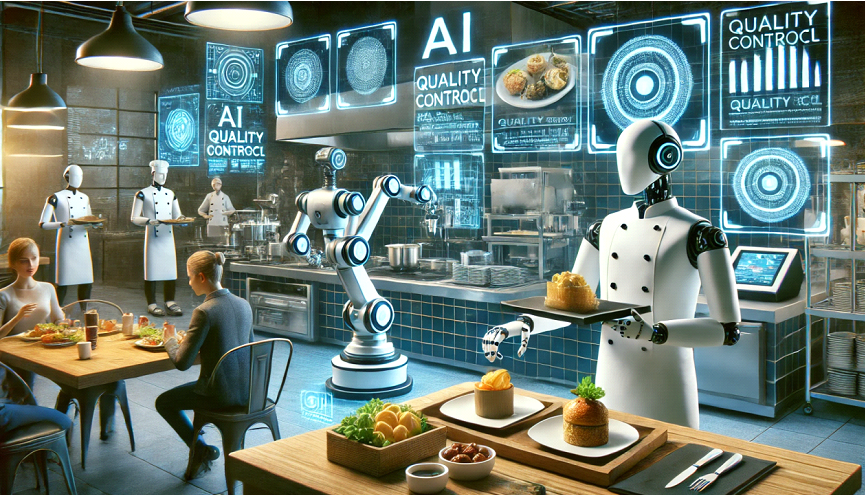
In 2025, Artificial Intelligence (AI) is no longer just a futuristic concept—it is actively reshaping the restaurant industry. From automated kitchens to AI-driven customer service, restaurants are leveraging AI to improve efficiency, reduce costs, and enhance customer experiences. Chef Shajahan M. Abdul, a renowned expert in the food industry and a leader at Restro Consultants Pvt. Ltd. (RCPL), has been at the forefront of this transformation. His insights on AI integration in restaurant operations highlight how businesses can stay competitive in this rapidly evolving market.
AI-driven chatbots and voice assistants are revolutionizing the way customers place orders. Restaurants are increasingly using AI to streamline digital ordering, whether through mobile apps, smart kiosks, or voice-activated assistants like Alexa and Google Assistant.
According to Chef Shajahan M Abdul, “AI-powered ordering systems enhance customer convenience while reducing errors in order processing. Personalized recommendations based on past orders also improve upselling strategies.”
AI-driven kitchen automation is minimizing human intervention, ensuring precision and speed. Many leading restaurant chains are adopting robotic chefs and AI-powered cooking devices that can prepare meals with consistency and accuracy.
Restro Consultants Pvt Ltd (RCPL) has been actively working with restaurants to integrate AI into their kitchens. Chef Shajahan M Abdul explains, “From smart ovens that adjust temperatures automatically to robotic arms flipping burgers, AI is making kitchens more efficient. This reduces food wastage and improves consistency.”
Restaurants like Spyce and Creator have already introduced AI-powered robots that cook gourmet meals in record time. Restaurant consultants believe this trend will continue to grow, especially in high-volume kitchens where efficiency is key.
One of the most significant challenges in the restaurant industry is efficiently managing inventory. AI is now being utilized to track stock levels, predict ingredient usage, and automate order placement with suppliers.
“AI eliminates human error in inventory management,” says Chef Shajahan M Abdul. “With predictive analytics, restaurants can reduce waste, optimize purchasing, and ensure they never run out of essential ingredients”
Companies like Restro Consultants Pvt Ltd (RCPL) are helping restaurants implement AI-based inventory systems that can:
⦁ Monitor stock in real time
⦁ Predict ingredient requirements based on sales data
⦁ Reduce food wastage through better forecasting
By using AI, restaurants can save thousands of dollars annually and operate with greater efficiency.
Personalised dining experiences are becoming the norm, thanks to the advancements in AI. With machine learning algorithms, restaurants can analyse customer data to offer tailor-made recommendations, discounts, and loyalty rewards.
Chef Abdul states, “AI-powered personalization enables restaurants to build stronger relationships with their customers.” It enables them to send personalized offers and menu suggestions tailored to individual dining habits.
For example, McDonald’s utilizes AI to personalize drive-thru menu displays based on weather conditions, time of day, and past orders. Similarly, AI-driven email marketing campaigns are helping restaurants boost customer retention.
Maintaining kitchen equipment is a crucial yet often overlooked aspect of restaurant management. AI is now being used for predictive maintenance, alerting restaurant owners about potential equipment failures before they happen.
“AI-enabled maintenance solutions prevent unexpected breakdowns and costly repairs,” says Chef Shajahan M Abdul. “They also help reduce energy consumption by optimizing the use of appliances”
Intelligent energy management systems powered by AI can analyze electricity usage and adjust settings accordingly, thereby reducing overall operational costs. Restro Consultants Pvt Ltd (RCPL) has helped numerous restaurants integrate AI-based predictive maintenance tools, ensuring smoother operations.
AI is also being used to optimize pricing strategies for restaurants. By analyzing customer demand, competitor pricing, and historical sales data, AI algorithms can dynamically adjust menu prices in real time.
According to restaurant consultants, dynamic pricing can maximize profits during peak hours while offering discounts during slow periods to attract more customers. AI-driven pricing tools, such as Wasteless and Sauce Pricing, are already being utilized by leading restaurant chains.
Artificial intelligence (AI) is playing a critical role in enhancing food safety standards. AI-powered cameras and sensors are now being used to monitor hygiene practices in real time, ensuring compliance with food safety regulations.
“AI is making food safety more reliable by detecting potential risks before they become major issues,” notes Chef Shajahan M Abdul. “From temperature monitoring to AI-driven quality control checks, restaurants can now maintain the highest hygiene standards with ease.”
Companies like PathSpot and Traqline are already using AI to detect contaminants on hands and food surfaces, preventing foodborne illnesses.
Restaurants are leveraging AI to improve their digital marketing efforts. AI-driven tools help create personalized advertisements, automate social media posts, and analyze customer feedback.
Restro Consultants Pvt Ltd (RCPL) has been guiding restaurants on how to utilize AI-powered marketing tools, such as ChatGPT and Jasper AI, to create engaging content and enhance SEO rankings.
“AI helps restaurants analyze social media trends and adjust marketing strategies accordingly,” says Chef Abdul. “It enables targeted advertising that increases customer engagement.”
AI is transforming the restaurant industry in ways never imagined before. From kitchen automation to personalized customer interactions, AI-driven solutions are enhancing efficiency, reducing costs, and elevating the dining experience. Chef Shajahan M. Abdul and his team at Restro Consultants Pvt. Ltd. (RCPL) continue to help restaurants leverage AI to stay ahead of the competition.
For restaurant owners looking to integrate AI into their operations, partnering with expert restaurant consultants can be the key to success. The future of dining is digital, and those who adapt quickly will thrive in the competitive landscape of 2025 and beyond.
Chef Abdul © Copyright 2024. All rights reserved.